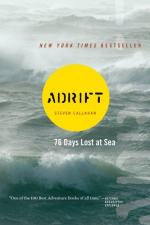|
This section contains 528 words (approx. 2 pages at 400 words per page) |

|
Adrift: Seventy-Six Days Lost at Sea Summary & Study Guide Description
Adrift: Seventy-Six Days Lost at Sea Summary & Study Guide includes comprehensive information and analysis to help you understand the book. This study guide contains the following sections:
This detailed literature summary also contains Topics for Discussion and a Free Quiz on Adrift: Seventy-Six Days Lost at Sea by Steven Callahan.
In Adrift, Steven Callahan is returning across the Atlantic in the boat he's designed, the Napoleon Solo. His ship is wrecked, and Callahan finds himself alone on the Atlantic Ocean with only a life raft and a limited amount of supplies. He battles hunger and fatigue, fighting his own impulses and stretching out his limited resources, hoping they are enough. After seventy-six days of man against nature, he is rescued.
As the book begins, Steven Callahan has just achieved his lifelong dream of crossing the Atlantic. He plans a return trip by entering his prototype vessel, the Napoleon Solo, into the Mini-Transat, a 600-mile transatlantic solos race from Penzance to the Canary Isles. However, Solo is damaged in gale-force winds and must stop for repairs. The race is lost. The Napoleon Solo is dry docked in Spain for two months. Callahan, growing impatient, lifts anchor in late January. Alone and sailing once more, he is bound for the Canary Isles.
Once again, the tiny Napoleon Solo runs afoul of weather. This time it does not survive. Callahan is set adrift in a life raft. After a frantic effort to salvage gear from his rapidly sinking vessel, Callahan bids farewell to his beloved ship and tries to adjust to his new context. Having meager reserves of food and water, Callahan quickly learns to fish for dorado with his spear gun and to desalinate seawater with solar stills.
Despite Callahan's best efforts, his body begins to deteriorate. His limbs atrophy. The saltwater eats away at his flesh. His diet of fish lacks important nutrients. Callahan fails to attract the attention of several passing vessels, but somehow manages to maintain morale, often slipping into daydreams. Callahan's equipment begins to fail, forcing him to jury-rig a repair for his spear gun. As time passes, Callahan becomes weaker and more dejected.
A thrashing fish inflicts near-catastrophic damage on the life raft. On the verge of panic, Callahan tries one temporary solution after another. Finally, after several soggy days of living in a waterlogged raft, Callahan repairs the breach with a spectacular feat of ingenuity. Though covered in crusty sores and exhausted by his ordeal, Callahan is once more optimistic. The waters have grown warm.
The heat has become oppressive. Callahan is continually fighting with unreliable solar stills. Often he is forced to choose between salt-tainted water or rainwater poisoned by contact with the raft's canopy. Callahan believes he is now over the continental shelf, but even as he watches for signs of land, his mind and body continue to degrade. Finally, the last solar still fails, forcing Callahan to rely on rain. Callahan's time is running short.
Late in April, Callahan spots land. The next day, after seventy-six days adrift, he is rescued by three fishermen. After convalescing in Marie Galante, the smallest island of Guadeloupe, he eventually returns to Maine. Many years later, Callahan writes of his ordeal and dedicates his life to helping those who have undergone similarly traumatic trials. Callahan's experience, lost and alone on the Atlantic, has taught him that a man's life is measured by the extent to which he shares it with others.
Read more from the Study Guide
|
This section contains 528 words (approx. 2 pages at 400 words per page) |

|



